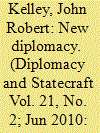| Srl | Item |
| 1 |
ID:
096918


|
|
|
|
|
| Publication |
2010.
|
| Summary/Abstract |
The continued rise of the non-state actor in twenty-first century international politics issues a potent challenge to state primacy in the area of diplomacy. Diplomacy's statist tradition, once the bedrock organising institution for pursuing international politics, is ceding influence to non-state actors-the "new" diplomats-who have displayed impressive skill at shaping policy through means that foreign ministries fail to grasp. To the chagrin of established scholars and practitioners, this paper claims that nothing has transpired to suggest the diplomatic profession is doing anything but pluralising. Furthermore, the process by which the foreign ministry opens itself to the public increasingly resides with the latter. Does this revolution mean the evolution of the "new diplomacy" has materialised? The contents in the following pages suggest so, and the main reason for this is built upon a radical view of agency: the age of diplomacy as an institution is giving way to an age of diplomacy as a behaviour. Yet despite who dominates in the art of influence, caveats remain and it appears likely that each side will need the other to achieve successful statecraft in the years to come.
|
|
|
|
|
|
|
|
|
|
|
|
|
|
|
|
| 2 |
ID:
087657


|
|
|
|
|
| Publication |
2009.
|
| Summary/Abstract |
As the Bush presidency draws to a close, the foreign policy community is taking stock of contemporary U.S.-Northeast Asian relations, assessing the challenges and opportunities that are likely to confront the next administration. China presents both in abundance, as reflected in ongoing tensions and misunderstandings in the Sino-American bilateral relationship. This article assesses the prospects for Washington to improve its relations with China through the mechanism of "track two" diplomacy. First, we expand on the track two concept by examining its main components and functions with illustrative examples. We extend the existing conceptualization of track two beyond its traditional conflict resolution functions and develop an account of it as a mechanism for policy coordination and the reorientation of regional dynamics from conflict to cooperation. Second, we identify major areas of U.S. interest in Northeast Asia and show how track two diplomacy might usefully be pursued within these contexts. Our analysis culminates with recommendations on how the Unites States should apply track two strategies in its relations with China.
|
|
|
|
|
|
|
|
|
|
|
|
|
|
|
|